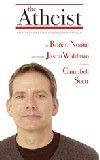Huntington Theatre Company Presents the Atheist
At the Wimberly Theatre in the Boston Center for the Arts
By: Mark Favermann - Sep 18, 2007
The Atheist
A One Character Play by Ronan Noone. Directed by Justin Waldman. Starring Campbell Scott At the Wimberly Theatre at the Boston Center for the Arts. A Presentation of the Huntington Theatre Company of Boston University. Approximate Running Time: 1 hour, 40 minutes; including 1 intermission. 9/12/2007 – 9/30/2007
http://www.huntingtontheatre.org/
Venal, malicious, greedy, avaricious, profane, voyeuristic, exhibitionistic, fraudulent, self-involved, angry, narcissistic, exploitive, devious, perverted, self-important, self-serving, surreptitious, conniving, delusional, untrustworthy and even larcenous are all descriptive of the main character, Augustine Early, played more than a bit eccentrically by Campbell Scott. This description is true of the other individual characters that he describes in great and at times amusing detail. This is a play about description.
We are never sure that these individuals are actually the way they are described. Or, are they described to fit Augustine's distorted worldview? Augustine Early, is a totally bent tabloid journalist with absolutely no moral compass or even any sense of a True North. As he describes, his whole life is about gainful survival and moving from one level to a strategically better one by unscrupulous behavior based upon smooth-mouthed chicanery, calculated shrewdness and perhaps dumb luck.
He has made a habit, even an art, of clawing his way up life's ladder leaving bloody claw marks on the ladder steps that include his almost always, according to him, deserving victims. Starting out as an impoverished 12 year old, he burns down his momma's double-wide so that6 the family can qualify more quickly for public housing, he gets into political blackmail and he seduces a 50-something widow who is also a virgin (don't ask!).When ace reporter Early turns a prominent politician's perverted predilections into front page squalid news, the ensuing scandal threatens to also undo Augustine himself. This is journalism at any cost—human, social, cultural, financial and of course political.
No character in the piece, neither Augustine Early nor any of the characters that he describes, is even a little admirable. As described by Augustine, each one has absolutely little or no redeeming attributes. Is this justification for his own personal culpable actions? Or is this a true reflection of our, or more to the point his, society and present day culture? Can we actually interpret our current news and even tell today? The world-wide web has made this even harder.
The Atheist is written by Huntington Playwriting Fellow Ronan Noone, whose play Brendan is also part of the Huntington's 2007-2008 Season, It is hard to totally understand what Noone is trying to say here. The words are clever even witty, but what is the message? The language and situations are more of another time than the present—perhaps the late 1940's or 50's. This is set in a context of old time muckraking journalism when multiple newspapers with Perry White-like editors actually were read-- not like our blog-slogged internet era. Yet, confusingly reference is made to video cameras, internet porn distribution and a less than cryptic reference to a Howard Stern-like radio shock jock.
Augustine Early is dressed like a hard drinking Midwestern reporter would have been in the late 50's or at best early '60's. This is somebody who fitted more into big city Chicago newspapers than into countrified regional papers in a backwater congressional district served by a conservative morally and even sexually challenged backbench congressman. This more confusing image evokes white suited, suspender wearing, straw hatted politicos of the 1930's. Perhaps, this underscores that the more things change, the more they stay the same, at least with corrupt politics.
Scott's twang/accent is hard to regionalize. It is not exactly unschooled, but more or less colloquial. Southern or border state, trailer trash or effected, it is hard to tell. What happened between Early's arson and landing his first job in journalism? How did he grow up? Was he educated? Where did he learn to write? Enquiring minds want to know. The author only leaves us unsatisfactorily guessing.
Augustine Early's total cynicism works to a degree. But, when things don't work for him, life becomes unfair to this complete cheater. By the way, the name Augustine Early must be a reference to Saint Augustine. This is the saint who developed the concept of original sin, Clearly, this is an apt attribution. Does Early emphasize the "original" in original sin? The Reverend William Sloan Coffin attributed the line "we should hate the sin, but love the sinner" to Saint Augustine. Is this what the playwright wants us to do?
This is sort of what happens in the piece. We actually enjoy, if not love, the main character. Yet, everything described is utterly reprehensible. Not one character is actually good or the least bit admirable in any moral sense. Augustine, himself, is a moral cipher. Does he actually believe what he spouts? The play is not particularly satisfying, yet Campbell Scott is unconventionally excellent. The play should be seen for Scott's performance alone.


